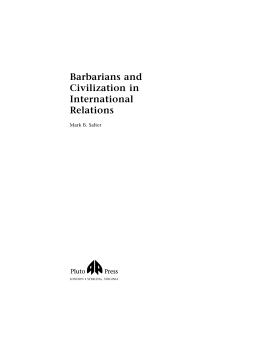
Additional Information
Book Details
Abstract
The terrorist attacks in New York and Washington have led to popular conceptions of Muslims as terrorists. Some commentators have harked back to the 'Clash of Civilizations' argument outlined by Samuel Huntington which argued that, after the collapse of the Cold War, culture would become the main axis of conflict for civilisational alliances.
Mark Salter takes issue with Huntington's theory and explains how the terms of his argument are part of an imperialist discourse that casts other civilisations as essentially barbarian.
Although many commentators have engaged with Huntington's claims, few have pursued the political implications of his argument. Barbarians and Civilisation offers a decisive exploration of the colonial rhetoric inherent in current political discourse. Charting the usefulness of concepts of culture and identity for understanding world politics, Salter brilliantly illustrates the benefits and the limitations of the civilised/barbarian dichotomy in international relations.
'A welcome and timely in contributing new thinking and scholarly research into one of the most complex and important questions of our time'
Discourse
Table of Contents
| Section Title | Page | Action | Price |
|---|---|---|---|
| Contents | vii | ||
| Acknowledgements | ix | ||
| 1. Introduction | 1 | ||
| 2. Civilization and Barbarians | 8 | ||
| 3. Empire of Barbarians | 28 | ||
| 4. A Civilized/ Barbaric Europe | 64 | ||
| 5. New Barbarians | 91 | ||
| 6. Decolonizing the Discipline: Forgetting the Imperial Past and the Imperial Present | 114 | ||
| 7. New Barbarians, Old Barbarians: Post- Cold War IR Theory. ‚Everything Old is New Again™ | 128 | ||
| 8. Conclusion: The Return of Culture, Identity, Civilization and Barbarians to International Relations | 156 | ||
| Epilogue: New Barbarians, New Civilizations and No New Clashes | 163 | ||
| Notes | 168 | ||
| Bibliography | 202 | ||
| Index | 221 | ||
| Abdel-Rhaman, Sheik Omar 2 | 2 | ||
| acculturation 25 | 25 |
